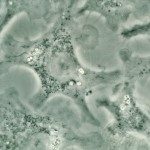Link to Pubmed [PMID] – 23443666
J. Biol. Chem. 2013 Apr;288(15):10715-21
Natural killer (NK) cells are important for innate immunity in particular through the production of IFN-γ and GM-CSF. Both cytokines are important in restoration of immune function of tolerized leukocytes under inflammatory events. The expression of TLRs in NK cells has been widely studied by analyzing the mRNA of these receptors, rarely seeking their protein expression. We previously showed that murine spleen NK cells express TLR9 intracellularly and respond to CpG oligodeoxynucleotide (CpG-ODN) by producing IFN-γ and GM-CSF. However, to get such production the presence of accessory cytokines (such as IL-15 and IL-18) was required, whereas CpG-ODN or accessory cytokines alone did not induce IFN-γ or GM-CSF. We show here that TLR9 overlaps with the Golgi apparatus in NK cells. Furthermore, CpG-ODN stimulation in the presence of accessory cytokines induces the phosphorylation of c-Jun, STAT3, and IκBα. IFN-γ and GM-CSF production requires NF-κB and STAT3 activation as well as Erk-dependent mechanisms for IFN-γ and p38 signaling for GM-CSF. Using knock-out-mice, we show that UNC93b1 and IL-12 (produced by NK cells themselves) are also necessary for IFN-γ and GM-CSF production. IFN-γ production was found to be MyD88- and TLR9-dependent, whereas GM-CSF was TLR9-independent but dependent on STING (stimulator of interferon genes), a cytosolic adaptor recently described for DNA sensing. Our study thereby allows us to gain insight into the mechanisms of synergy between accessory cytokines and CpG-ODN in NK cells. It also identifies a new and alternative signaling pathway for CpG-ODN in murine NK cells.

